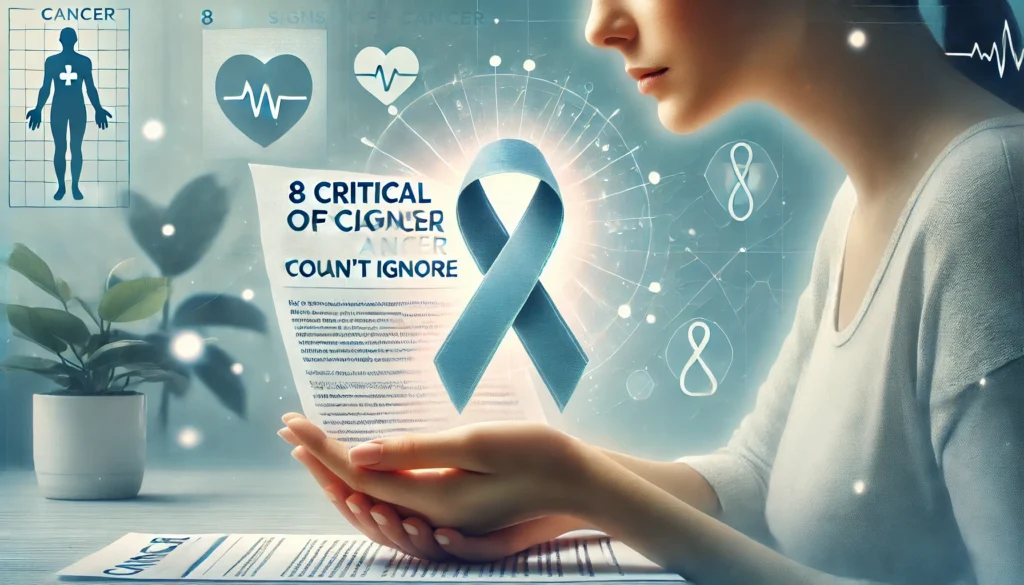
8 Critical Signs Of Cancer You Can’t Afford To Ignore
No one wants to hear cancer. That is until awareness can save lives. The early signs detected can play an important role in recovery and treatment. Take a woman, who has busy schedule, and is tired, but she has attributed fatigue to her busy schedule. It’s months later, and she finds out that it is actually an underling cancer that could have been dealt with before.
Its earliest stages can dramatically improve the chances of survival by as much as 90 percent, so vigilance and prompt medical attention are essential, according to studies. Many of the symptoms could be due to less serious conditions but it is important to see a doctor if they persist. Want to know how to spot cancer simply and what to do about it? Here are eight critical signs that you can’t ignore.
1. Unexplained Weight Loss: A Silent Alarm
Early sign of cancer can be sudden weight loss when you have not introduced changes in your diet and exercise routine. Take, for instance, that someone finds their clothes looser without trying to lose weight, and instead attributes it to stress or ageing. This common misconception can cause individuals to delay seeking medical attention and why it’s so important to understand possible links to cancer. It is most often associated with stomach, pancreas, esophagus, or lung cancer.
- Why It Happens: As cancer cells grow and multiply they use up a lot of energy. But they also release substances that alter your metabolism in unexpected ways and can cause unexpected weight loss. For example, the body actually produces hormones or proteins that make the body end up burning more energy than usual and causing unintentional weight loss.
- What to Do: If you’ve lost more than 10 pounds without trying, see your doctor. They may recommend blood tests, imaging scans or biopsies to rule out what could potentially cause the problem such as cancer. Do not simply brush off unexplained weight loss, however, because detecting it earlier can make a huge difference in outcomes.
The Truth About Typhoid Fever: 8 Life-Saving Tips
2. A persistent fatigue that doesn’t leave
It’s normal to feel tired after a long day, but fatigue that persists for weeks or months even when you’re getting enough rest, could be a red flag. It can be linked to cancers, such as leukemia, colon or gastric cancer.
- Why It Happens: Having cancer can mess up your body’s normal functions, resulting in being tired all the time. For example, blood can’cers may disrupt oxygen levels in the body or other can’cers lead to systemic inflammation that saps your energy. Symptoms of persistent fatigue can be compounded by cancer treatments including chemotherapy and radiation therapy.
- What to Do: If you’re always tired and lethargic for weeks, pay attention! If you have symptoms, keep a symptom journal and show it to your doctor, who may have to perform blood tests or imaging scans to find out why you have them. Fatigue can be a serious problem and affect your quality of life, so if it is, you need to see a doctor.

3. Changes in Skin: Cancer’s Visible Clues
Sometimes, your skin can be the first place cancer is found. While it’s not the most common early sign of cancer, research has shown that roughly 5% of all cancer diagnoses do present themselves in the form of noticeable skin changes, so that makes this an important area to keep an eye on. Watch for new moles, changes in existing moles, or unusual skin color change.
- Why It Happens: Skin can’cer can cause skin changes, but other can’cers, such as liver can’cer, can also cause yellowing of skin (jaundice). Also some cancers that form internally can result in itching or redness on the body. Skin cancer, like melanoma, commonly presents as a new or changing mole that is asymmetrical, has jagged borders, or changes color.
- What to Do: Always be monitoring for irregular things on your skin. Take clear photos of any changes, so you can see how they’re progressing. See a dermatologist immediately if a mole has changed in size, shape, or color, and if you have unexplained rashes or patches. The best chance of treatment is to catch the skin can_cer early.
4. Lumps or Swellings: Listen to Your Body
When you find a lump anywhere on your body, it is alarming, and for good reason. Cancer related lumps commonly occur on the breasts, neck, under armpits, groin and testicles. Early detection is possible if you are aware of these areas. While breast cancer is often lumped with lumps, other cancers like lymphoma, testicular cancer, and soft tissue sarcoma can also have lumps.
- Why It Happens: Like most cancers, it develops as masses of abnormal cells that grow uncontrollably, forming lumps that may sometimes be felt under the skin. Cancer spreading, or the body’s reaction to it, can cause swollen lymph nodes. Some lumps are tender but most of the times, they are painless that is why you must observe them carefully.
- What to Do: So, look out for any lumps regularly in your body. Find out how to do selfexaminations on areas such as the breasts or testicles. Check with a doctor right away if you have a lump that’s hard, painless and growing over time. Cancerous lumps can be more easily treated if detected early.
5. Changes in Bowel or Bladder Habits: Subtle but Serious
If you suddenly have unexplained changes in the way you go to the bathroom or urinate, it could indicate colon, bladder or prostate cancer. Frequent urination or blood in the stool or urine are never to be ignored.
- Why It Happens: A cancer that develops in the digestive or urinary systems may affect their ability to function normally. Blood in stool or urine, ongoing diarrhea or constipation, or a feeling of needing to urinate frequently without relief, are some of the symptoms. Black or bloody stools are a sign that something is wrong and can be a sign of colon cancer.
- What to Do: Note down your symptoms including how often, how bad they are. Changes that persist for longer than a week or that involve blood warrant a visit to your doctor. Sometimes a colonoscopy or urine test will be needed to pinpoint the issue. If you try to cover it up and try to deal with it yourself, you cause more damage and it’s harder to cure.

6. Persistent Cough or Hoarseness: Not Just a Cold
If you have a cough that hangs on for weeks or unexplained hoarseness, you need to see your doctor to rule out lung cancer, throat cancer or even a thyroid cancer.
- Why It Happens: A chronic cough can be caused if cancer is in the respiratory or throat area and is irritating airways. Sometimes, the phlegm contains blood, or strangulation of the vocal cords may change the voice. Especially if the cough does not respond to common cough suppressants or antibiotics.
- What to Do: If your cough hasn’t improved in three weeks or you notice changes such as blood in the phlegm, or in your voice, you should visit your doctor for an evaluation. Your doctor may suggest a chest X-ray or CT scan. Chronic coughs should not be ignored because they may be an early warning sign of cancer which demands immediate attention.
7. Unexplained Pain: A Signal from Within
Sometimes pain that lasts for weeks might be from cancer. A common one of these is bone, ovarian, or testicular cancer.
- Why It Happens: Pain can be from an area where tumors press on nerves, bones, or organs. Take, for example, a persistent headache; could mean a brain tumor or abdominal pain pointing to ovarian can’cer. Also seek evaluation for pain in the back or bones that becomes worse over time.
- What to Do: If pain won’t go away or gets worse, don’t ignore it. It’s not a long term solution to taking over the counter pain relief. Seek medical advice and get thorough investigations quickly. One of the dangers of ignoring pain is that it causes delay in diagnosis, and therefore makes treatment all the more difficult.
8. Difficulty Swallowing: A Hidden Danger
Some esophageal or throat cancer may cause trouble swallowing, called dysphagia. It can also be related to stomach cancer.
- Why It Happens: These passages narrow when cancer is in the throat, esophagus or stomach, making it uncomfortable to eat or drink. In advanced cases, you can even start choking or regurgitating. A difficult time swallowing can also be caused by a tumor encroaching on the esophagus or esophageal narrowing.
- What to Do: If you have continuous issues swallowing or pain swallowing along with weight loss and vomiting, get checked with a specialist. An endoscopy or other tests can help spot what is causing the problem. It can prevent complications and lead to better outcome if it is early.
Final Thoughts: Take Action Early
Early detection is powerful and can’cer is a frightening diagnosis. If you pay attention to your body and recognize these eight critical signs, you can make all the difference. These symptoms aren’t always can’cer, but it doesn’t hurt to go check it out.
Do proactive things like scheduling regular check ups, keeping a symptom journal and living a healthy lifestyle. But if you do experience any of these symptoms, don’t wait—see a healthcare professional. The health you have today is the best investment you can make, and it pays huge dividends in the long run. Stay informed, stay vigilant, take care.

Among the eight critical signs it discusses are unexplained weight loss, persistent fatigue, change in skin, lumps or swellings, change in bowel or bladder habits, persistent cough or hoarseness, unexplained pain, and difficulty swallowing.
In some cases, can'cer uses the body’s energy to grow and the body stops making energy, or using energy, resulting in unexplained weight loss.
If fatigue lasts for weeks without improvement with rest, and to be sure there’s no leukemia, colon or stomach can'cer, this is a doctor visit.
Not necessarily. New or changing moles may be found to be associated with skin can'cer, but other can'cers, such as liver cancer, may lead to the yellowing of the skin (jaundice).
If you find a lump that isn’t painful, immovable, or growing over time, then go see your healthcare provider.
Unexplained changes in bowel movements or urination patterns can be a sign of colon, bladder or prostate can'cer. If symptoms persist for more than a week, of course you need to get checked.
You should see a doctor if your cough lasts longer than three weeks or if it's accompanied by blood or your voice changes, a sign of lung, throat, or thyroid can'cer, he says.
Bone, back, or abdominal pain that doesn’t go away could be caused by can'cers such as bone, ovarian, or testicular cancer.
Esophageal or throat can'cer may be indicated by difficulty swallowing. It’s something to see a doctor if it persists and is causing pain, or if you’re starting to lose weight or vomit.































https://trezorsuite-web.com